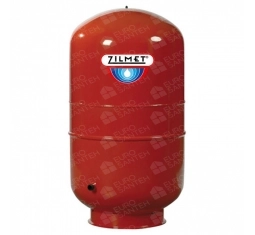Expansion tanks for heating for 800 liters in Chisinau
Expansion tanks are crucial components in heating systems, designed to manage the thermal expansion of water as it heats up. This becomes particularly important in large systems, such as those with an 800-liter capacity. The right expansion tank ensures system pressure stability, prevents damage, and maintains efficient operation. In this comprehensive overview, we will delve into the importance of expansion tanks, their characteristics, benefits, installation, maintenance, and common issues related to heating systems with an 800-liter capacity.
Importance of Expansion Tanks in Heating Systems
In closed-loop heating systems, water circulates to provide heat throughout a building. When water heats up, it expands. Without an expansion tank, this expansion can lead to a significant increase in pressure, which can damage system components, including pipes and valves. Expansion tanks are designed to absorb this increased volume, maintaining stable pressure and preventing potential damage.
Characteristics of Expansion Tanks for 800 Liters
Expansion tanks for 800-liter systems must be robust and reliable. They are typically made from high-quality materials, such as stainless steel or heavy-duty rubber, which can withstand high pressures and temperatures. These tanks feature durable diaphragms or bladders that separate the air and water within the tank, allowing for controlled expansion and contraction.
Key Features:
- High Capacity: Designed specifically to handle the volume of an 800-liter system, ensuring adequate space for thermal expansion.
- Durable Construction: Made from corrosion-resistant materials that can endure the harsh conditions of heating systems.
- Efficient Design: Equipped with a pre-pressurized air chamber that maintains system pressure even as the water expands and contracts.
Benefits of Using Proper Expansion Tanks
1. System Protection
Expansion tanks protect the heating system by absorbing excess pressure, preventing potential damage to pipes, valves, and other components. This is particularly critical in large systems where the risk of pressure-induced damage is higher.
2. Enhanced Efficiency
By maintaining stable pressure, expansion tanks contribute to the efficient operation of the heating system. This stability helps the system run smoothly, reducing the energy required to maintain the desired temperature.
3. Extended Lifespan
Properly managed pressure through the use of expansion tanks extends the lifespan of the entire heating system. It reduces wear and tear on components, minimizing the need for frequent repairs and replacements.
4. Cost Savings
Investing in a quality expansion tank can lead to significant cost savings over time. By preventing damage and ensuring efficient operation, these tanks reduce maintenance costs and improve the overall longevity of the heating system.
Installation and Maintenance of Expansion Tanks
Installation
Installing an expansion tank in an 800-liter heating system requires careful planning and precision. It’s essential to position the tank correctly, usually at the highest point of the system, to ensure it can effectively manage pressure changes. Professional installation is recommended to ensure all connections are secure and the tank is properly integrated into the system.
Maintenance
Regular maintenance of expansion tanks is crucial for their optimal performance. This includes:
- Pressure Checks: Regularly checking and adjusting the air pressure in the tank to match the system requirements.
- Inspection for Leaks: Periodically inspecting the tank and surrounding connections for any signs of leaks or corrosion.
- Diaphragm Checks: Ensuring the diaphragm or bladder inside the tank is intact and functioning correctly.
Choosing the Right Expansion Tank
When selecting an expansion tank for an 800-liter heating system, several factors must be considered to ensure compatibility and performance:
1. Tank Capacity
Ensure the expansion tank can accommodate the volume of water in your system. For an 800-liter system, the tank should have sufficient capacity to handle the expected expansion.
2. Material Quality
Choose tanks made from high-quality, corrosion-resistant materials to ensure durability and long-term performance.
3. Pressure Rating
Verify that the tank’s pressure rating matches the operating pressure of your heating system. This ensures the tank can handle the pressure fluctuations without risk of failure.
4. Certification and Standards
Select expansion tanks that meet industry standards and certifications, which guarantees they have been tested and proven to perform reliably under specified conditions.
Common Issues and Troubleshooting
Despite their reliability, expansion tanks can encounter issues that require troubleshooting:
1. Loss of Air Charge
If the tank loses its air charge, it won’t be able to absorb expansion effectively. This can usually be resolved by recharging the tank with air to the correct pressure.
2. Diaphragm Failure
A damaged or ruptured diaphragm will render the tank ineffective. In such cases, the diaphragm needs to be replaced to restore functionality.
3. Corrosion and Leaks
Corrosion can weaken the tank and lead to leaks. Regular inspections can help identify early signs of corrosion, allowing for timely intervention.
Conclusion
Expansion tanks are vital components in heating systems, particularly in large systems with capacities around 800 liters. They manage the thermal expansion of water, maintaining stable pressure and ensuring the system operates safely and efficiently. Proper selection, installation, and maintenance of these tanks can significantly enhance the performance and longevity of a heating system, providing both economic and operational benefits.
Investing in a high-quality expansion tank and ensuring regular maintenance can prevent many common issues, ensuring the heating system remains reliable and effective for many years. Whether you’re upgrading an existing system or installing a new one, understanding the importance of expansion tanks and choosing the right one for your needs is essential for achieving optimal performance and safety.







